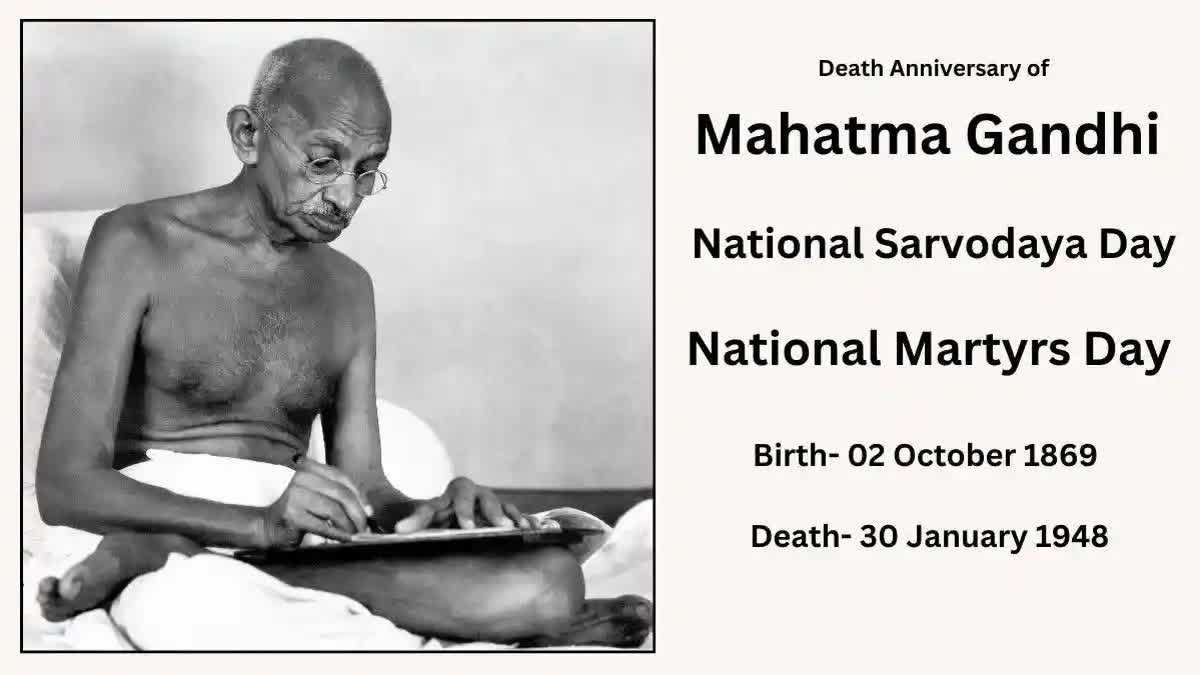Hyderabad: The globe is commemorating the 76th anniversary of Mahatma Gandhi's death anniversary today. Many people consider him to be one of history's most inspirational figures. Gandhi, who is cherishedly referred to as "Bapu" in India, was instrumental in the country's fight for independence from the British Raj. His impact was felt far beyond India, establishing him as a global icon of social justice, nonviolence, and peace.
Nationwide Protests and Freedom Struggle: Gandhi took the lead in organising mass demonstrations across the country against the British Raj. His goal was to establish a free India where all people may live in equality and dignity, irrespective of caste or religion. The Indian independence struggle was propelled by a dedication to nonviolence and Satyagraha, or the insistence on the truth.
Beyond Political Freedom: Gandhi was a political figurehead as well as a supporter of numerous social issues. He supported ending poverty, advancing women's rights, and doing away with untouchability. His vision encompassed the idea of Sarvodaya, which stands for "Progress of All" or "Universal Uplift." Gandhi came up with this phrase to express his vision of an egalitarian society where everyone had the right to self-determination.
Martyrs' Day: Honouring Sacrifices:Gandhi was assassinated on January 30, 1948, by Nathuram Godse. Martyrs' Day, or Shaheed Diwas, celebrates everyone who gave their life in service of the country, regardless of when Gandhi was killed. It is a sombre time to consider the costs incurred in the fight for freedom.
Tragic Assassination: Gandhi was doing his evening prayers at Birla House when Godse, a Hindu Mahasabha member, approached him. This is when the tragic event in Delhi took place. After giving Gandhi a salute, Godse took out a handgun and shot him three times in the chest, which resulted in his death . A vacuum was left in the hearts of the country and the globe when Gandhi was pronounced dead two hours later.
Post-Independence Legacy: Gandhi devoted his life to advancing nonviolence, fraternity, and peace in the newly independent country, and his influence continued even after independence. He was dubbed the "Father of the Nation" for his steadfast adherence to these ideals. Gandhi's impact was international, and his nonviolent policies gained him recognition on a global scale.
Lesser-Known Aspects of Gandhi's Life:
Dietary Choices and Vegetarianism: Gandhi strictly adhered to a vegetarian diet, as outlined in his book, 'The Moral Basis of Vegetarianism.' His daily sustenance consisted of fresh vegetables, curd, fruits, seeds, and nuts. Gandhi believed that non-violence was the path to freedom and introduced the concept of Satyagraha, emphasising active love as the antithesis of violence.
Tolstoy Farm and Untouchability: In addition to his political endeavours, Gandhi established Tolstoy Farm, a small colony situated 21 miles from Johannesburg, South Africa. This initiative aimed to support colleagues in the Satyagraha struggle. Furthermore, Gandhi launched campaigns to abolish untouchability, referring to those affected as "Harijans" or "Children of God" in 1932.
Intellectual Pursuits and Correspondence with Tolstoy:Gandhi's correspondence with the renowned author Leo Tolstoy stands as a testament to his intellectual pursuits. Beyond politics, he worked to revive India's handloom industry, with a special focus on khadi. During Jawaharlal Nehru's iconic "Tryst with Destiny" speech celebrating independence, Gandhi was notably absent.
Global Recognition:The Reserve Bank of India issued the Gandhi series banknotes in 1996, featuring a portrait of Mahatma Gandhi on denominations like 10 and 500 rupees. The establishment of the Gandhi Memorial Museum in Madurai, Tamil Nadu, in 1959, further preserves his memory and includes a blood-stained garment worn by him during his assassination.
Gandhian Ideologies: Gandhi's ideologies were deeply rooted in principles that shaped not only his political strategies but also his personal conduct.
Truth and Non-Violence: Truth and non-violence, considered twin cardinal principles, represented the relative truth of truthfulness in words and deeds and the absolute truth—God and morality.
